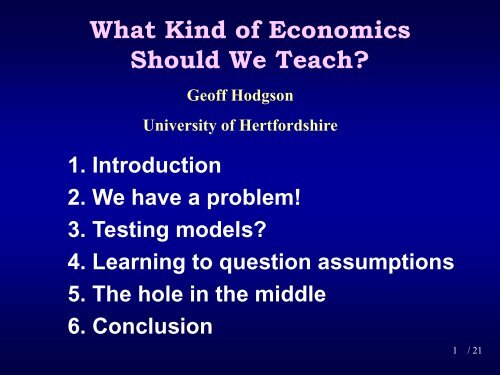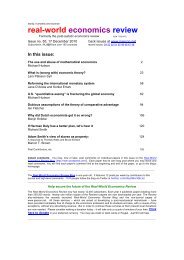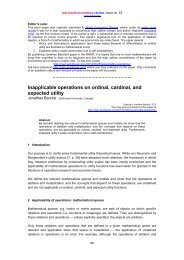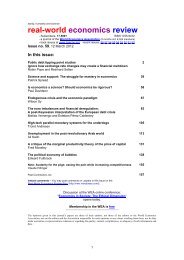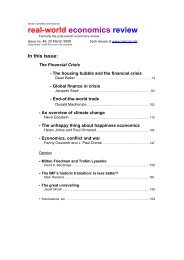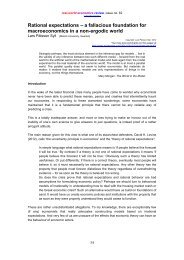What Kind of Economics Should We Teach?
What Kind of Economics Should We Teach?
What Kind of Economics Should We Teach?
You also want an ePaper? Increase the reach of your titles
YUMPU automatically turns print PDFs into web optimized ePapers that Google loves.
<strong>What</strong> <strong>Kind</strong> <strong>of</strong> <strong>Economics</strong><br />
<strong>Should</strong> <strong>We</strong> <strong>Teach</strong>?<br />
Ge<strong>of</strong>f Hodgson<br />
University <strong>of</strong> Hertfordshire<br />
1. Introduction<br />
2. <strong>We</strong> have a problem!<br />
3. Testing models?<br />
4. Learning to question assumptions<br />
5. The hole in the middle<br />
6. Conclusion<br />
1<br />
/ 21
1. Introduction<br />
<strong>What</strong> kind <strong>of</strong> economics should we teach?<br />
• <strong>We</strong> do not argue for the removal <strong>of</strong> mathematics<br />
from economics.<br />
• A major problem is the domination <strong>of</strong> technique<br />
over substance.<br />
• A focus on mathematical elegance has diverted<br />
economists from real-world phenomena.<br />
• Students are not trained adequately to discriminate<br />
between different assumptions, theories or models.<br />
2<br />
/ 21
2. <strong>We</strong> have a problem!<br />
<strong>What</strong> kind <strong>of</strong> economics should we teach?<br />
1988 AEA Commission: “graduate programs<br />
may be turning out a generation with too many<br />
idiot savants skilled in technique but innocent<br />
<strong>of</strong> real economic issues”<br />
Alan Blinder (1990): “students and faculty ...<br />
obsessed with technique over substance ...<br />
exams ... tested mathematical puzzle-solving<br />
ability, not substantive knowledge about<br />
economics”<br />
3<br />
/ 21
2. <strong>We</strong> have a problem!<br />
<strong>What</strong> kind <strong>of</strong> economics should we teach?<br />
Only 3 per cent <strong>of</strong> graduate students on<br />
top US economics programmes saw<br />
“having a thorough knowledge <strong>of</strong> the<br />
economy” as important.<br />
But 57 per cent believed that “excellence<br />
in mathematics” was very important<br />
(Klamer and Colander 1990).<br />
4<br />
/ 21
2. <strong>We</strong> have a problem!<br />
<strong>What</strong> kind <strong>of</strong> economics should we teach?<br />
Mark Blaug (1997):<br />
“Modern economics is sick. ...<br />
Economists have converted the<br />
subject into a sort <strong>of</strong> social<br />
mathematics in which analytical<br />
rigour is everything and practical<br />
relevance is nothing.”<br />
5<br />
/ 21
2. <strong>We</strong> have a problem!<br />
<strong>What</strong> kind <strong>of</strong> economics should we teach?<br />
Nobel Laureate Ronald Coase (1997)<br />
“Existing economics is a theoretical system<br />
which floats in the air and which bears little<br />
relation to what happens in the real world.”<br />
Nobel Laureate Milton Friedman (1999)<br />
“economics has become increasingly an<br />
arcane branch <strong>of</strong> mathematics rather than<br />
dealing with real economic problems.”<br />
6<br />
/ 21
2. <strong>We</strong> have a problem!<br />
<strong>What</strong> kind <strong>of</strong> economics should we teach?<br />
Nobel Laureate Paul Krugman (2009):<br />
“… predictive failure was the least <strong>of</strong> the<br />
field’s problems. More important was the<br />
pr<strong>of</strong>ession’s blindness to the very possibility <strong>of</strong><br />
catastrophic failures in a market economy ...<br />
the economics pr<strong>of</strong>ession went astray<br />
because economists … mistook beauty, clad<br />
in impressive-looking mathematics, for truth”<br />
7<br />
/ 21
<strong>What</strong> kind <strong>of</strong> economics should we teach?<br />
3. Testing Models?<br />
(How) Do <strong>We</strong> Test Our Models?<br />
Nobel Laureate Wassily Leontief (1982) found<br />
that 50% <strong>of</strong> American Economic Review<br />
articles had models but no data.<br />
E. Ray Canterbery and Robert J. Burkhardt<br />
(1983) found that only 3 out <strong>of</strong> 542 empirical<br />
articles in top economics journals attempted to<br />
falsify the proposed hypotheses.<br />
8<br />
/ 21
<strong>What</strong> kind <strong>of</strong> economics should we teach?<br />
3. Testing Models?<br />
Daniel B. Klein and Pedro P. Romero (2007):<br />
– Out <strong>of</strong> 66 articles in the 2004 volume <strong>of</strong> JET,<br />
27 failed to define their real-world object <strong>of</strong><br />
analysis.<br />
– Only 8 described what their theory is about<br />
and attempted to explain the merit and<br />
importance <strong>of</strong> that theory.<br />
9<br />
/ 21
<strong>What</strong> kind <strong>of</strong> economics should we teach?<br />
3. Testing Models?<br />
Knockout empirical tests are rare, and in<br />
principle difficult (Boland 1989).<br />
In choosing theories or assumptions,<br />
econometrics cannot do all <strong>of</strong> the work.<br />
Complexity inhibits prediction.<br />
Science is principally about causal<br />
explanation.<br />
10<br />
/ 21
4. Learning to question assumptions<br />
<strong>What</strong> kind <strong>of</strong> economics should we teach?<br />
Additional skills are needed to adjudicate<br />
between theories.<br />
Students need training in the philosophy<br />
<strong>of</strong> science.<br />
Importance <strong>of</strong> conceptual precision.<br />
Learning from the history <strong>of</strong> economics.<br />
11<br />
/ 21
4. Learning to question assumptions<br />
<strong>What</strong> kind <strong>of</strong> economics should we teach?<br />
John Maynard Keynes<br />
12<br />
/ 21
4. Learning to question assumptions<br />
John Maynard Keynes:<br />
<strong>What</strong> kind <strong>of</strong> economics should we teach?<br />
“the master-economist ... must be<br />
mathematician, historian, statesman,<br />
philosopher .... He must understand symbols<br />
and speak in words. ... He must study the<br />
present in the light <strong>of</strong> the past for the<br />
purposes <strong>of</strong> the future. No part <strong>of</strong> a man’s<br />
nature or his institutions must lie entirely<br />
outside his regard.”<br />
13<br />
/ 21
5. The hole in the middle<br />
<strong>What</strong> kind <strong>of</strong> economics should we teach?<br />
complete<br />
Extent <strong>of</strong><br />
knowledge and<br />
deliberative<br />
(rational)<br />
consideration <strong>of</strong> the<br />
(rational)<br />
deliberation and<br />
knowledge <strong>of</strong> other<br />
individual actors<br />
absent<br />
logicall<br />
y<br />
empty<br />
simple<br />
monopoly<br />
one two<br />
imperfect competition<br />
without strategic interaction<br />
perfect<br />
competition<br />
many<br />
Minimum number <strong>of</strong> actors<br />
14<br />
/ 21
5. The hole in the middle<br />
<strong>What</strong> kind <strong>of</strong> economics should we teach?<br />
complete<br />
Extent <strong>of</strong><br />
knowledge and<br />
deliberative<br />
(rational)<br />
consideration <strong>of</strong> the<br />
(rational)<br />
deliberation and<br />
knowledge <strong>of</strong> other<br />
individual actors<br />
absent<br />
logicall<br />
y<br />
empty<br />
simple<br />
monopoly<br />
one two<br />
imperfect competition<br />
without strategic interaction<br />
rational expectations<br />
modeling<br />
perfect<br />
competition<br />
many<br />
Minimum number <strong>of</strong> actors<br />
15<br />
/ 21
5. The hole in the middle<br />
<strong>What</strong> kind <strong>of</strong> economics should we teach?<br />
complete<br />
Extent <strong>of</strong><br />
knowledge and<br />
deliberative<br />
(rational)<br />
consideration <strong>of</strong> the<br />
(rational)<br />
deliberation and<br />
knowledge <strong>of</strong> other<br />
individual actors<br />
absent<br />
logicall<br />
y<br />
empty<br />
simple<br />
monopoly<br />
one two<br />
the realm <strong>of</strong> game theory<br />
imperfect competition<br />
without strategic interaction<br />
rational expectations<br />
modeling<br />
perfect<br />
competition<br />
many<br />
Minimum number <strong>of</strong> actors<br />
16<br />
/ 21
5. The hole in the middle<br />
<strong>What</strong> kind <strong>of</strong> economics should we teach?<br />
complete<br />
Extent <strong>of</strong><br />
knowledge and<br />
deliberative<br />
(rational)<br />
consideration <strong>of</strong> the<br />
(rational)<br />
deliberation and<br />
knowledge <strong>of</strong> other<br />
individual actors<br />
absent<br />
logicall<br />
y<br />
empty<br />
simple<br />
monopoly<br />
one two<br />
the realm <strong>of</strong> game theory<br />
the institutional and<br />
evolutionary realm <strong>of</strong><br />
bounded rationality,<br />
habits, rules <strong>of</strong> thumb,<br />
and behavioural<br />
algorithms<br />
imperfect competition<br />
without strategic interaction<br />
rational expectations<br />
modeling<br />
perfect<br />
competition<br />
many<br />
Minimum number <strong>of</strong> actors<br />
17<br />
/ 21
5. The hole in the middle<br />
Frank Hahn (1991):<br />
<strong>What</strong> kind <strong>of</strong> economics should we teach?<br />
“theorising <strong>of</strong> the ‘pure’ sort will become ... less<br />
and less possible ... rather radical changes in<br />
questions and methods are required ... our<br />
successors have to be far less concerned with<br />
the general ... they will study particular histories<br />
and methods capable <strong>of</strong> dealing with the<br />
complexity <strong>of</strong> the particular ... less frequently for<br />
them the pleasures <strong>of</strong> theorems and pro<strong>of</strong>.<br />
Instead the uncertain embrace <strong>of</strong> history and<br />
sociology and biology.”<br />
18<br />
/ 21
6. Conclusion<br />
<strong>What</strong> kind <strong>of</strong> economics should we teach?<br />
Models are important, but we must be<br />
aware <strong>of</strong> their limitations<br />
=> philosophy + history <strong>of</strong> thought +<br />
economic history<br />
Students should be trained to question<br />
assumptions and adjudicate wisely<br />
between competing explanations.<br />
19<br />
/ 21
6. Conclusion<br />
<strong>What</strong> kind <strong>of</strong> economics should we teach?<br />
Do today’s PhDs in <strong>Economics</strong> read these economists?<br />
Adam Smith?<br />
Alfred Marshall?<br />
Joseph Schumpeter?<br />
Frank Knight?<br />
Gunnar Myrdal?<br />
Karl Marx?<br />
Thorstein Veblen?<br />
John Maynard Keynes?<br />
Friedrich Hayek?<br />
Herbert Simon?<br />
20<br />
/ 21
<strong>What</strong> kind <strong>of</strong> economics should we teach?<br />
6. Conclusion<br />
“The purpose <strong>of</strong> studying<br />
economics is not to acquire a<br />
set <strong>of</strong> ready-made answers<br />
to economic questions, but to<br />
learn how to avoid being<br />
deceived by economists”<br />
Joan Robinson<br />
21<br />
/ 21


